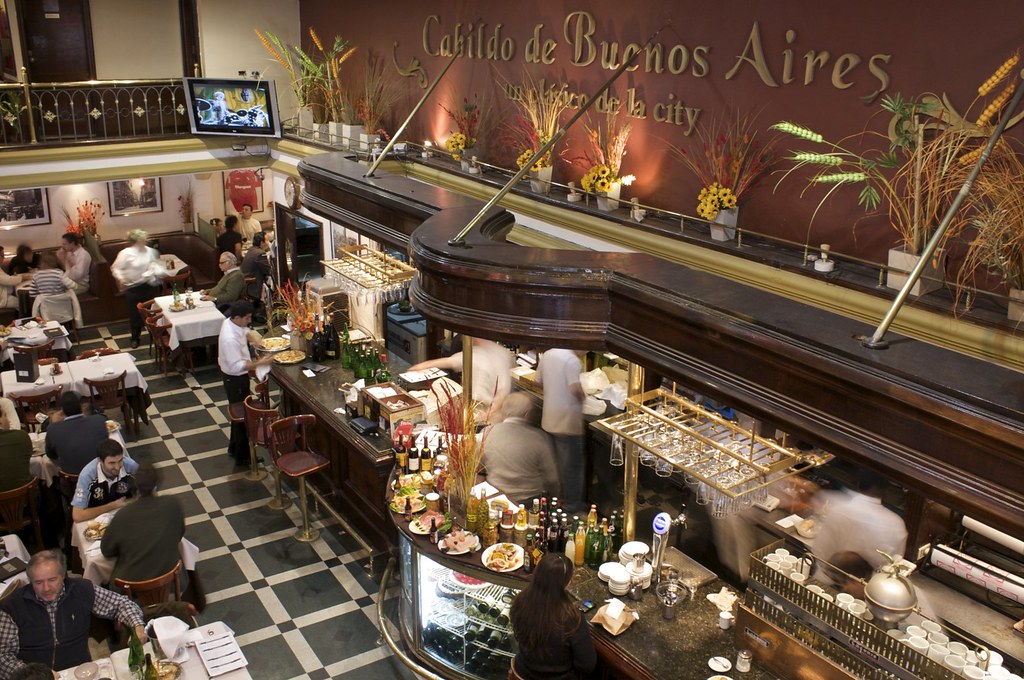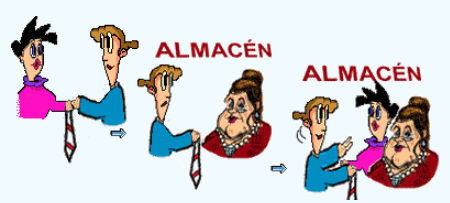2.6: El pretérito y el imperfecto
- Page ID
- 163077
There are two simple past tenses in Spanish. These are the preterit and imperfect. In the paragraph below, identify the verbs in the imperfect and those in the preterit by writing them in two different columns in your notebook following the model below.
 Comida de memorias
Comida de memorias
En varios barrios de Buenos Aires, hay restaurantes que lograron mezclar la comida casera con métodos culinarios nuevos. Fernanda Tabares abrió su restaurante, "Raíces" en 2010. Trabajó muchos años en restaurantes de cocinas étnicas pero cuando llegaba a su casa lo único que quería comer era comida casera. Era un restaurante para comer "como en casa". Dijo la chef, “Me pareció que era un homenaje a las abuelas...Queríamos ser el restaurante del barrio... "
(Adaptado de "Como lo hacía la abuela: sabores con memoria emotiva" por Jimena Pepe Arias)
| Verbos en el pretérito | Verbos en el imperfecto |
As seen in the examples below, two sentences that are nearly identical except for the use of one past tense or the other to convey different meanings depending on how the past is perceived: from outside as something already complete and finished (preterit), or from inside as something still in progress (imperfect).
|
Ya preparaste el desayuno |
Aún preparabas el desayuno. |
| Preterit | Imperfect |
La fiesta terminó a las doce de la noche. Estuvo buenísima |
Eran las doce y la fiesta todavía no terminaba. Estaba buenísima It was twelve, and the party was not over yet. It was super fun. |
| Additional contrastive examples | |
| El cielo estuvo nublado ayer. The sky was cloudy yesterday. (A complete event framed in the past and viewed as completed.) |
El cielo estaba nublado ayer. The sky was cloudy yesterday. (A description that the speaker is reliving.) |
| Cuando subí las escaleras, sonó el teléfono. When (after) I went up the stairs, the phone rang. (Finished process) |
Cuando subía las escaleras, sonó el teléfono. When (while) I was going up the stairs, the phone rang. (I was in the process of going up the stairs _an unfinished action) |
| Ana trabajó dos o tres años en un restaurante. Ana worked in a restaurant for two or three years. (A definite time frame limiting the scope of the action) |
Ana antes trabajaba en un restaurante. Ana used to work in a restaurant in the past. (Describes an indefinite period, an unfinished action) |
!A practicar!
Escribe la forma verbal que corresponde a cada situación, como en el ejemplo. [Ejercicio interactivo] (Diccionario).
| 1. Ayer sonó el teléfono cuando me senté / sentaba a desayunar. | a. me sentaba : b. me senté : |
Aún me estaba sentando. Ya estaba sentado. |
| 2. Fueron / Iban al mercado, pero regresaron a buscar la lista de compras. | a. ____________: b. ____________: |
Llegaron al mercado. No llegaron al mercado. |
| 3. Empezó a leer el libro y le gustó / gustaba ... | a. ____________: b. ____________: |
Definitivamente le gustó. No se sabe si por fin le gustó. |
| 4. Te vi cuando subí / subía las escaleras al segundo piso. | a. ____________: b. ____________: |
Yo estaba en las escaleras. Yo estaba en el segundo piso. |
| 5. Estaban nerviosos y no supieron / sabían qué responder. | a. ____________: b. ____________: |
Tal vez respondieron bien. No respondieron bien. |
| 6. Abrí la puerta pero el perro no quiso / quería entrar. | a. ____________: b. ____________: |
No entró. No se sabe si entró o no. |
| 7. La casa fue / era bonita. | a. ____________: b. ____________: |
Todavía puede ser bonita. Ya no es bonita. |
| 8. La ciudad estuvo / estaba en ruinas. | a. ____________: b. ____________: |
Fue reconstruida. No se sabe si aún está en ruinas. |
- Respuestas
-
2. a) fueron (llegaron), b) iban (no llegaron)
3. a) gustó (definitivamente), b) gustaba (no se sabe)
4. a) subía (estaba en las escaleras), b) subí (estaba en el segundo piso)
5. a) no sabían (tal vez sí respondieron), b) no supieron (no respondieron bien)
6. a) no quiso (no entró), b) no quería (no se sabe si entró)
7. a) era (todavía puede ser), b) fue (ya no es)
8. a) estuvo (fue reconstruida), b) estaba (no se sabe si aún está)
Completa los huecos con el verbo en parentésis en pretérito o imperfecto
| 1. En su cumpleaños, su amiga le ________ (regalar) a Jorge una corbata, pero no le ________ (gustar) el estilo. 2. Al día siguiente Jorge ________ (decidir) devolverla al almacén porque ________ (querer) una más moderna. 3. Entonces ________ (ir) al almacén y, mientras ________ (hablar) con la vendedora, ________ (ver ) a su amiga en la tienda. 4. Como no ________ (querer) ofenderla, le ________ (decir) que 5. ________ (estar) comprando otra igual porque esa ________ (ser) bellísima. 6. Y así ________ (ser) como ________ (terminar) con dos corbatas que no le ________ (gustar). |
 |
- Answer
-
1. regaló - gustaba 2. decidió - quería 3. fue - hablaba - vio
4. quería - dijo 5. estaba - era 6. fue - terminó - gustaban/gustaron
Contributions and Attributions
Adapted article from "Como lo hacía la abuela: sabores con memoria emotiva" por Jimena Pepe Arias
Page contents about the use of the preterit and imperfect adapted from Spanish Grammar Manual by Yepes.
Restaurant photo by Esteban Maldonado A. CC-SA-NC-2
Activity 1 and 2 from Spanish Grammar Manual by Yepes.



